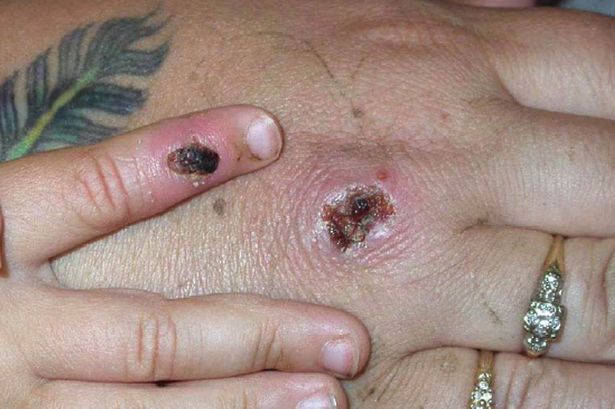The UK Health Security Agency has said the latest Mpox cases are a reminder “the infection has not gone away”.
The UKHSA has urged people to remain vigilant to Mpox [previously known as Monkeypox] ahead of the summer months, as the latest data shows an increase in cases in the UK over the past four weeks.
In an update published this week, Thursday, May 25, a further ten cases of Mpox have been diagnosed in the UK since the last epidemiological update at the beginning of May. This brings the total number of new cases in the UK since the beginning of the year to 20.
READ MORE: Fight in the street leads to petrol being poured over vehicle
All the cases were diagnosed within the country’s capital with half of them in unvaccinated individuals and two in those who had only received one dose. Five of the cases acquired the infection in the UK, four are thought to have acquired the infection abroad and one remains under investigation.
The UKHSA argues vaccination has played a “crucial role” in protecting people and reducing case numbers. Those who are eligible but have not yet received two doses of the vaccine are being encouraged to come forward and book their first dose by Friday, June 16 and be booked in for their second dose by the end of July 2023.
Katy Sinka, head of sexually transmitted infections at UKHSA, said: “It is clear from these latest statistics that Mpox has not gone away. While Mpox infection is mild for many, it can cause severe symptoms for some so it’s important people remain alert to the risks.
“Vaccination is key to reducing the severity of symptoms and preventing further transmission. Uptake of first doses has been strong but only around a third of those who have received their first dose have had their second dose so far.
“The programme is coming to an end, so we strongly encourage everyone eligible to please come forward for vaccination if you haven’t yet had one or two doses. Our aim is to eliminate this unpleasant disease from the UK entirely – vaccination and community action have worked very well to significantly reduce case numbers and we can’t let our guard down now.”
Mpox is a rare infection which is mainly spread by wild animals in parts of West or Central Africa. The risk of catching it in the UK tends to be low, there was an increase of cases in the UK last year.
Gay men, bisexual men or men who have sex with other men, in particular, were urged to pay extra attention to the symptoms of the virus as the UKHSA claims “the majority of the cases” identified to date have been among this group.
The UK was the first in the world to detect the outbreak, acting immediately to alert global health partners, control further transmission and secure vaccines for all those at highest risk in the UK. The government claims it remains committed to sustaining reduced transmission of Mpox and achieving the ultimate goal of eliminating transmission of the disease in the UK.
To find your nearest mpox vaccination site, you can visit the NHS site finder.
READ NEXT:
- Two teenagers drown as warning issued over open water
- Men punched and kicked to ground in 'despicable' attack
- Accountant turned drug dealer breaks down in tears after judge's question
- Fight in the street leads to petrol being poured over vehicle
- Frankie Bridge looks 'flawless' in £46 New Look dress 'perfect for a wedding'

